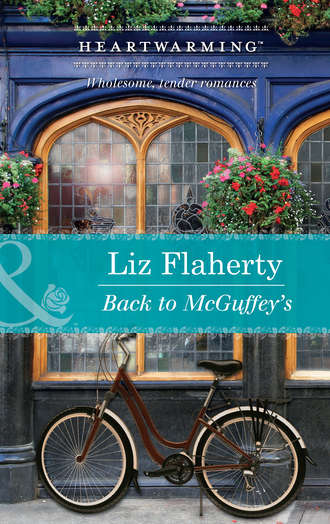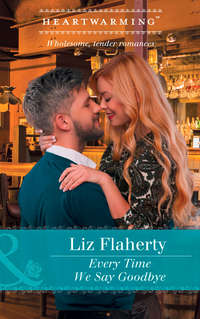
Полная версия
Back to McGuffey's
“So.” Joann shuffled the papers into a folder and turned off her laptop. She closed it and slipped it back into her briefcase. “Any ideas? You’re not going to rebuild, are you?”
“Probably not.” Kate’s street had gone from being beginner-home-cozy to a row of buildings that mostly contained small businesses with second-story office or living space. The single-family dwellings and duplexes that were left didn’t seem to belong anymore. While it still wasn’t a bad place to live, she didn’t want to spend the rest of her life there, either. At least, she didn’t think she did.
The back door opened and Penny came in, wearing a ragged sweater over jeans and a T-shirt with a slogan proclaiming it had been stolen from the Fionnegan Police Department. “You’re all right?” She took Joann’s cup from her hand and sipped, looking at Kate over its rim.
Joann took back the mug. “She’s fine. Get your own cup and see if Marce has any more of that coffee cake. For me, not you. You’re still trying to lose baby weight.”
Penny gave her a baleful look. “Michael is ten.” She brought the coffee carafe and the cake and sat at the island with the other two women.
Marce came back into the kitchen. “Doesn’t take long to make beds when you only have two guests. It also helps that one of them is gone half the time and the other one made her own bed,” she grumbled. “Now I’ll have to eat some of this coffee cake so it won’t go to waste.”
“I can take some with me,” Penny offered generously. “I’d be in good with the boys. Might even be able to get them to start cleaning their room. They wouldn’t finish, but starting would be real progress.”
“No, that’s okay.” Marce got herself a cup and plate and came to sit down. She cut the remaining cake into four pieces and passed them around. “See? No problem.”
“How busy is the inn, Marce?” asked Kate.
The older woman sipped her coffee. “In mud season, it’s often slow. It’s not always full in summer, either, though trail cyclists are changing that. We have some nearly every weekend. In the fall and winter, you don’t have time to blow your nose, so don’t even think of getting a cold. I’ve never gotten rich, by any means, but like the old saying goes, it’s a living. In the off-season, it’s a party place. Teas and showers. Meetings now and then. The dining room and the two parlors run into each other and you can accommodate up to fifty if they don’t all want to sit down at the same time, not nearly so many if they do.”
“How many guest rooms?” asked Joann.
“Two suites—the one Kate’s in and the two-bedroom one over the garage, which also has a kitchenette—and three rooms. They all have private baths, phones, wireless internet and television. I fought Frank tooth and nail over television, saying the kind of clientele we’d attract wanted peace and quiet. He said they wanted to choose their own kind of peace, and he was right.” Marce’s eyes misted over. “It seems I’m looking for Frank every time I turn a corner. The truth is he’s not there, and I need to stop looking. Maybe a couple of months away would help me with that.”
The women helped her load the dishwasher before saying their goodbyes and leaving the big Victorian. Joann returned to her office and Kate walked as far as Penny’s house with her before heading out on her own.
At loose ends for the first time in longer than she could remember, she wasn’t sure where to go. It wasn’t as though Fionnegan, Vermont, presented many choices. There were two stoplights downtown and a caution light on Worship Street at the intersection with a church on every corner. There weren’t any strip malls or chain restaurants yet, nor was there much physical space for growth, the town being nestled into the Green Mountains the way it was. So people still shopped and ate downtown, and sat on the park benches the chamber of commerce placed in front of every business. Fionnegan was a good place to live, to raise children, to find, as Frank Comer had said, one’s own kind of peace.
Before she knew it, she found herself walking along the path that meandered through dips and shallow valleys toward the more difficult trails that climbed Wish Mountain. Kate felt unaccustomed restlessness. What did she want to do? Did she want, for the first time in her thirty-seven years, to move away from the Northeast Kingdom to a place that offered longer summers, less mud and—and what? Something different. She could move to Tennessee, near the log home on Dale Hollow Lake where her parents were so happy, or the Nashville suburb to be near her sister.
But she realized neither of those places would be home. The wanderlust that had made her family relocate and had put motor homes in their driveways had skipped her completely. Whatever she decided to do, it needed to be here.
“Coming up behind!” The shout came just before something—or someone—knocked her right off her feet, pushing her not so neatly into the mud on the edge of the trail that led down to Tierney’s Creek.
“I’m sorry,” said a familiar voice. “I know better, but I think I flunked looking where I was going in running school. Are you all right?”
Hands, wide palmed but with long and slender fingers, helped her up.
And Kate looked up into the eyes she’d once planned on looking into for the rest of her life.
“Ben,” she said, “I’m way too old for you to sweep me off my feet again. And it’s just barely May—the creek’s still freezing.”
He snorted. “Like it won’t still be freezing in July.” His voice was like a caress as he brushed her down, easing the sharp edges of her nerves even as a new—or maybe remembered—excitement thumped through her veins. “I heard about the fire. You all right?”
She wondered if his blood pressure was fluctuating as much as hers was. His eyes were still deep and mossy green, his handsome face even more compelling at thirty-nine than it had been in high school. His legs below the baggy running shorts were lean and muscled, and if he’d added any weight to his six-feet-plus frame, it was in all the right places. His hair, wheat-blond and arrow-straight, still needed cutting, though it wasn’t long enough to pull back into a leather thong anymore. This was, she admitted to herself, exactly what she noticed about him every time she saw him, but something felt different today. Warmer. Intenser. Intenser? Was that a word or just a sensation that made her veins jump around like they had electrical charges in them?
“My dad hated the ponytail.” She felt herself blush. Idiot. Her father’s opinion of her high school boyfriend’s hair hadn’t mattered twenty years ago—it mattered even less now. “But Mom said he was being a curmudgeon.”
He pushed his hair back from his face. “Pop hated it, too, but it sure did keep it out of the way. And I thought I looked really cool.” He kept looking at her. “Oh, man.”
“What?” She looked around. There were dogs farther up the trail, barking insistently. The leaves were coming on strong even though she could still see her breath in the late-morning air, but she didn’t see anything to have caused the frustration in his voice.
“You look great, Katy,” he said. “You do.”
She would congratulate herself later on whatever kind of willpower it was that kept her from putting a smoothing hand to her hair and tugging her sweatshirt down over her hips. Hips that had grown some in the past thirteen years. “Thank you,” she said. “So do you.” With a nod and a smile that even felt vague—she could only imagine how it looked—she started off again. “Take care, Ben.”
“You, too.”
But she was less than ten feet away when he said, “Hey!” and she stopped, feeling his nearness even before he came to stand beside her. “Where are you going?” he asked.
“I don’t know.” Her smile felt rueful this time—she felt rueful. “I don’t have anywhere to go, which feels strange. I’m unemployed and homeless.”
He put his hands on her shoulders, and she felt the warmth immediately. It made her understand how Dirty Sally felt when she found the blanket with a heating pad under it on the inn’s porch swing.
Ben turned her around briskly. “Nope,” he said, “I don’t see any signs that you’ve become a bag lady overnight.”
“Appearances can be deceiving,” she said. “But, since we’re here, what’s this I hear about you coming back to Fionnegan? I thought Boston was your dream.”
Something changed in his eyes, though she wasn’t sure what it was. She had to stop herself from touching his face, offering comfort for a pain she didn’t understand.
“I’m here for the summer—I just took a partial leave from my office. We’ll see what happens after that.” His voice was deliberately—and not all that convincingly—casual. He shrugged and fell into step beside her when she started walking again, more disturbed than she wanted to admit by the impression that something was wrong.
“Did you have a fire, too?” She met his gaze for just an instant, long enough to reestablish the connection that never seemed to entirely break, then looked away. If she didn’t watch where she was going, she was going to end up in Tierney’s Creek yet, and she didn’t have any clean clothes to put on if she did. “An internal one, maybe?”
He was silent long enough she thought she might have overstepped the bounds of questions old girlfriends could ask.
“Sometimes,” he said finally, “what you dream of isn’t what you wanted after all. Sometimes you mistake other people’s dreams for your own.”
Kate didn’t know, because none of her dreams had come true. If anyone else had had dreams for her, they probably hadn’t come true, either. Her parents, who had run the gamut from being hippies in college to becoming startlingly conservative schoolteachers to selling their house and taking off for Tennessee in a motor home, had never visited their own ambitions on their daughters.
She wasn’t unhappy with her life or the choices she’d made, exactly, but none of the things she’d written about in her adolescent diaries had come to pass. There were no young Bens or little Kates running around; she’d never passed meds at a hospital or comforted patients in her doctor-husband’s office; she’d never even slept in a dorm or gone to any of the parties her sister and Joann Demotte had talked about. The only talents she was sure she had involved answering the phone and making copies. Oh, and coffee. They’d miss her coffee back at Schuyler and Lund.
“I discovered,” he said, “that I had a bigger ego than I was comfortable with, something which wouldn’t have surprised my basketball coaches, but shocked the heck out of me. I began to feel a sense of—” He stopped, seeming to struggle with what came next.
“Entitlement?” she suggested, having worked with lawyers who’d been overendowed with that particular shortcoming.
“Yeah, I think so.” His tone became self-mocking. “Like I shouldn’t have to answer the phone in the middle of the night anymore and seriously ill patients really could take two aspirin and call me in the morning. It no longer bothered me that as part of a large practice, I seldom got to know the patients. After all, I was helping them, wasn’t I? And the other partners in the practice—man, they are good. It’s not as though patients needed me specifically.”
“But?” she said, stepping out and around a tree root and greatly enjoying it when he bumped into her once again.
He steadied her and kept an arm looped over her shoulders when they walked on. “But I don’t have time to ski or ride my bike or read the newspaper or even play basketball at the Y. I haven’t read a book from start to finish since I read Green Eggs and Ham to my brother’s kids at Christmastime.”
“Well, Ben, you’re busy. People are nowadays. They just are. Look at Penny and Dan. She caters all the time, he works twelve-hour shifts at the police department plus officiating at high school football and basketball games.”
“Yeah, and they still take care of their kids and however many they’re fostering at any given moment. Plus, he makes time to ride or go skiing every time I come back to town. I know they’re busier than I am, but they still make a life. I just make lots of money.”
Kate thought of the state of her bank account and her employment status. Although making money had never been at the top of her list of things that made her happy, she wished she’d been able to save more of what she had made.
“The first thing I thought of,” he said quietly, “when I heard about your fire, was that I’d send a check. We grew up together, shared more than I’ve probably shared with anyone in my life, including the woman I married, and that was all I could think, was that I’d send you a check.”
“I’d have understood,” she said, just as quietly, but she was hurt by the very notion of it. This was a man who knew every secret she’d ever had and had never told any of them. He’d made the three-hour drive from Boston to Fionnegan when she and Tark Bridger broke up just to make sure she was all right. “It wouldn’t look good,” he’d explained, “if you’d killed yourself with me being a doctor and all.” She’d laughed so hard she’d cried, and he’d held her close and hard, then gotten back in his car and driven back to Boston in time to work a night shift in the emergency room.
No, she wouldn’t have understood. Not at all. She’d have torn up the check.
“You’d have torn it up,” he said, echoing her thoughts so exactly she laughed out loud. “So if we end this walk by schlepping through the vacant lot behind the tavern, will you let me buy you lunch?”
“I could be talked into it.”
Of course, that was nothing new. He’d always been able to talk her into anything.
Oh, come on, Katy. You can do this hill with one hand tied behind your back.
We’ll be back before your folks wake up.
We’re going to get married, anyway, right?
It’s only beer. It’s not like really drinking.
Oh, come on, Katy...
* * *
MCGUFFEY’S TAVERN HAD sat at the corner of Main Street and Creamery Road—and Tim McGuffey had stood behind the bar—for as long as Kate could remember. Maeve, Ben’s mother, ran the kitchen with an iron hand, and between the two of them, they’d reared two doctors, a priest and a college professor. Every kid in town who’d ever needed lunch money to get through the week had earned it by washing glasses at McGuffey’s.
Old habits die hard. As soon as she finished her potato soup and corned beef sandwich, Kate moved to the triple sinks behind the bar.
“Take a break, Pop, and go wheedle potato soup out of Ma,” suggested Ben. “Kate and I’ll earn our keep while you eat.” He reached for an apron and tied it around her waist.
“Think I will, at that.” Tim, elegant as always in his crisp white shirt and black vest, kissed Kate’s cheek as he passed. “There’s a lass. We’re sorry about your house, but you’re better off without that blighted job.”
She flashed him a smile, taking startled and concerned note of his grayish complexion, the dark circles under his twinkling Irish eyes. No, you can’t be old. “Thanks, Tim.”
For a while, she did feel like she was better off. Brushing hips and elbows with Ben behind the bar was like old times, only with slightly matured hormones. Calling greetings to patrons was a lot more fun than saying in a hushed and professional voice, “Good morning. Schuyler and Lund. How may I direct your call?”
“You still carry a good tray of glasses,” said Ben, catching her as she took empties back to the bar. He lifted the tray from her hands and set it on the nearest table. “Can you still dance, too?” And with no accompaniment other than clapping and shouting customers, he whirled her away between the tables, moving the way Tim and Maeve had taught them years ago. Keeping them in each other’s arms to dance, Maeve had said later, was their way of keeping them out of each other’s arms in the backseat of a car.
“And you,” Kate said, flushed and laughing when they ended up back where they’d started, “still talk good blarney, Ben McGuffey.” She was quiet for a moment, then smiled into his face. “It was fun,” she said quietly, “and for a little while, we were young again. Something, at least, wasn’t in ashes. Thank you for that. I needed it.” She stood on tiptoe to brush a kiss along the line of his jaw, then took off her apron and pushed it into his hands. “Tell your folks so long for me—I have to go.”
She fled before he could stop her.
On the way back to Kingdom Comer, she stopped at the now-vacant double lot on Alcott Street where her house had stood. The long piece of land with an unexpected grove of maples at its back was cordoned off with police tape, and the charred remains of her duplex still smoked. She remembered her excitement when she’d bought the white clapboard saltbox, her plans for making it into a single dwelling when she could afford it. There would have been room for several children and a couple of dogs, for cats to lie on heat registers and the porch swing. She’d haunted rummage sales and antiques shops, searching out blue-and-white dishes and quilts with love stitched into them.
The last time she’d danced between the tables with Ben, he’d told her he didn’t want to be her boyfriend anymore. She’d felt, even as she nodded agreement and kissed him goodbye with all the bonhomie she could muster, as though the bottom had fallen out of the world. She’d felt lonely and afraid and betrayed. She’d stared blindly into the soapy water in the bar sink and wondered what in the world she was going to do now.
Thirteen years later, still warm from being in Ben’s arms, still hearing the music of the dance, she looked at the place where her house had stood. And wondered what in the world she was going to do now.
CHAPTER TWO
KATE MUMBLED UNMUSICALLY about making lists and checking them twice as she went over, for what was more like the twentieth time, the inventory of contents for her house. “I didn’t keep receipts from garage sales,” she told Penny and Marce, who were discussing recipes across the kitchen island from where she sat. She closed her eyes and shook her head. “Of course, even if I had, they’d have burned up.”
“I think you should buy the inn from Marce,” said Penny, “and we should be partners. I can’t afford half—no one will pay enough for the kids or Dan’s ’57 Chevy for that—but I’m good for twenty-five percent and I’ll throw in one of the boys. Michael gives good shoulder-rubs, but Josh takes out the trash without being asked.”
Kate got up and went around to hug her. “We’ve been best friends since first grade. I’m not giving that up for a partnership. Not to mention, I don’t think Marce is interested in selling.”
Penny looked sorrowful. “I can’t get you to take any of the kids, even if we don’t buy the inn?”
“Not a one. You’d end up wanting them back and we’d fight over them. The kids would like it—the boys always like a good fight—but it would be ugly for us. We’re too old for the whole hair-pulling thing.”
“Oh, well, okay.” Penny stopped poring over coffee cake recipes and leaned her chin in her palm. “So, best friend, how was lunch with Ben yesterday?”
“It was fine,” said Kate, “but I swear, he seems as much at loose ends as I am.”
“He is.” Marce got up when the bell on the oven dinged, opening the back door to admit Joann at the same time.
Kate looked up in surprise. “You’ve talked to him, Marce?”
“My word, I thought you knew. He’s the tenant in the garage apartment. He said he thought he’d outgrown spending summers with his parents.” Marce handed out scones before biting into one herself. “I don’t know about these. They’re cranberry, which some people are quite picky about. What do you think?”
Kate took a taste, blowing out crumbs when she sighed in ecstasy. “Yum. You need to forget about college and the B and B, Marce. You and Penny need to build a bakery where my house used to be.”
“I’ll insure you,” Joann offered, grabbing another scone before she’d finished the first one. She held up the second one. “This is the real meaning of insurance. If you’re in a kitchen with a bunch of women, don’t be too polite or you’ll end up with nothing to eat but the parsley garnish on the plate.”
Penny ignored her, latching on to the bakery idea. “But who would teach my boys algebra?” she demanded. “Although if it was a bakery and caterer combined, I could be the catering half and just make Dan help the boys with their math.”
Joann shook her head. “Dan was in my class. He only got by with a C minus because he was charming and Mrs. Wildermuth was susceptible. He should have flunked.”
Penny smiled fondly. “He was something, wasn’t he?”
“So, anyway.” Joann leaned her elbows on the solid surface of the island. “How was lunch at McGuffey’s, Kate? I heard you and Ben danced and that no one heard the music except you two.”
“That doesn’t mean anything.” Penny snorted derisively. “Everybody dances at McGuffey’s.”
“Not at lunchtime, without music,” said Marce wisely, “although Frank and I did, and then we had the twins.” She paused, her cup halfway to her mouth, her eyes softening in memory.
“That’s a lie,” Kate accused, sending more crumbs flying.
Marce smacked her with a folded napkin. “It is not a lie. We danced at McGuffey’s and then a year later the twins were born.” She refilled everyone’s coffee cups, grinning. “It was a really long pregnancy.”
“All of them are,” Penny agreed.
Joann sighed. “I’ve heard all these stories before. I just want to know about Kate and Ben’s lunch.”
“We just walked a little, talked some and ate potato soup and corned beef sandwiches. On that rye bread Maeve makes from scratch. You need to get her recipe when you open your bakery.” Kate looked down at her list, trying not to remember the momentary look in Ben’s eyes. She ached, knowing something was wrong but not what it was. “My refrigerator was really old. Do you think I could list that under Antiques and increase its value?”
“I remember that refrigerator.” Joann reached for the cream pitcher. “You would have had to pay someone to haul it away, so you need to reimburse the insurance company for that.”
It was easy to laugh when Kate was in Kingdom Comer’s kitchen with her friends or even when she was walking with Ben McGuffey, but later that night, when she was alone in the back suite of the B and B, her situation was overwhelming. She sat in the window seat of the sitting room, hugging her knees and staring at the stars that peeked through the maple trees in the inn’s backyard. Below, Dirty Sally walked slowly across the courtyard toward the pet door that led into the three-season room on the back of the inn. Before she got there, however, a man stepped into Kate’s view and scooped the cat up, cuddling her against the side of his neck.
Ben.
They’d always been able to talk. One long and cold night soon after he’d broken up with her, she’d sat in the dark for hours, the silence of her apartment a screaming assault to her senses. Penny was just a few blocks away, but it was Ben’s voice she needed to hear.
The day she and Tark Bridger had broken their engagement, it had taken all the willpower she had not to get Ben’s number from his parents and call him. In the end, she hadn’t had to—he’d just shown up and made her laugh. He’d held her until she’d stopped shaking. When the laughter turned to tears, he mopped them up with a dish towel on her kitchen counter. Later, after he’d kissed her cheek and tugged at her ponytail before returning to Boston, she’d put the towel at the back of her underwear drawer. Sometimes, when she couldn’t convince herself she was only independent and not lonely, she’d take the towel out and hold it against her cheek.
Even at the weddings and funerals where they’d seen each other for the past thirteen years, they’d stood in corners and talked long beyond the point of good manners. Afterward, she would always tuck the memories of those conversations away behind her heart as carefully as she had stored the worn dish towel.






